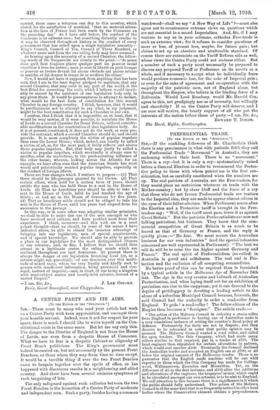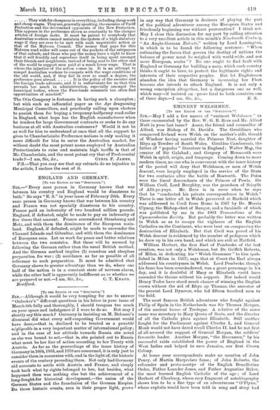PREFERENTIAL TRADE.
[To THE EDITOR OF TEE "SPECTATOR."]
SIR,—If the confiding followers of Mr. Chmlierlain think there is any genuineness in what with pathetic faith they call the Preferential Trade " Movement" in Australia, they are reckoning without their host. There is no " movement."
There is a cry—but it is only a cry—systematically raised before a General Election in order to recommend the Protec- tive policy .to those with whom patriotism is the first con- sideration, but as carefully smothered when the numbers are
up. The real patriots of Australia are the Free-traders, for they would place no restriction whatever on trade with the Mother-country ; but by sheer bluff and the force of a cry that those who do not favour Preferential trade are traitors to the Imperial idea, they are made to appear almost odious in the eyes of their fellow-electors. When Parliament meets after the Election and a Protective tariff is brought in the Free-
traders say : " Well, if the tariff must pass, lower it as against Great Britain." But the patriotic Preferentialists are now not talking patriotism, but business. They know that the com- mercial competition of Great Britain is as much to be feared as that of Germany or France, and the reply is quietly given :—" No fear. We must secure the Australian business for our own industries" (and the special industries concerned are well represented in Parliament). "The best we will do will be to raise the tax higher against Germany and France." The real spirit of Preferentialism (so-called) in
Australia is greed and selfishness. The real end is Pro- tection and the exclusion of all competing commodities.
No better proof of this can be required than is furnished
by a typical article in the Melbourne Age of November 24th last. The Age is the very creator and bulwark of Australian Protectionism, and when laying itself out for an exhibition of
patriotism can rise to the empyrean; yet it can descend to the depths of pettifoggery in devoting a leading article to the abuse of a suburban Municipal Council because, forsooth, the said Council had the audacity to order a road-roller from England. Ye gods ! a road-roller ! The fellow-citizen of the Empire then* becomes a " foreigner." The article reads r-
" The action of the Malvern Council in ordering a steam roller from England in preference to having one of Australian make is a very scandalous instance of setting the country's fiscal policy at defiance. Fortunately the facts are not in dispute ; and they deserve to be rehearsed in order that public opinion may be aroused. The Malvern Council wanted a road roller, and called for open tenders. The- Otis Company, which had made many rollers similar to that required, put in a tender at £795. The local engineer then stipulated for certain alterations in pattern, which would cost another £100. Eventually the Council declined the Australian tender and accepted an English one at £790, or £5 below the original amount of the Melbourne tender. There is no guarantee that the English made machine will be one whit superior to those which the Otis Company has made for Coiling- wood, Williamstown, Essendon and Moorabbin. Yet, on the difference of £5 in the first instance, and £105 after the additions and alterations of the engineer, the taxpayers' money, which ought to be circulated amongst our own artisans, is to be sent to England. We call attention to this because there is a significance in it which the public should fully understand. This action of the Malvern Council is of the same kind that is so frequently noticed in other local bodies where the Conservative element obtains a preponderance.
They wish for cheapness in everything, including cheap work and cheap wages. They are, generally speaking, the enemies of Tariff Protection and the determined opponents of the New Protection. This appears in the preference shown so constantly to the cheaper irtieles of foreign make. It must be patent to everybody that Australian workers cannot maintain the system of a high statutory wage if they are ever to be met with such unpatriotic action as that of the Malvern Council. The money that pays for this Malvern road roller will come out of the pockets of the ratepayers of that suburb, and those who pay the money have a right to know that it will fructify and reproduce itself in being spent amongst their friends and neighbours, instead of being sent to the other end of the world to support men paid at a much lower wage. That is where the injustice of the action comes in. It is an attempt to compel Australian workers to compete with the wage conditions of the old world, and, if they fail in ever so small a degree, the preference goes abroad It is the policy of the sweater and the foreign trade advocate, and it is unfortunate for us that this prevails too much in administration, especially amongst the municipal bodies, where the Free-trade remnants too often find opportunities of mischief."
The Otis Company is fortunate in having such a champion ; but with such an influential paper as the Age dragooning Municipal Councillors, and practically calling upon electors to punish them for buying a twopenny-halfpenny road-roller in England, what hope has the English manufacturer when he tenders for large Government contracts or seeks to do any business at all with Australian customers ? Would it not be as well for him to understand at once that all the support he gives to Chamberlainite Preference notions is only snaking it more difficult for him to enter the Australian market, for without doubt the most potent name employed by Australian Protectionists to raise and maintain high tariffs is that of Mr. Chamberlain, and the most potent cry that of Preferential trade P—I am, Sir, &c., CYRIL F. JAMES. P.S.—That you may see that my extracts do no injustice to the article, I enclose the rest of it.















































 Previous page
Previous page